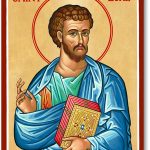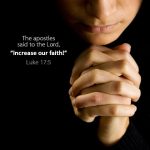“Lord, Increase Our Faith”
All three readings for this Sunday center on one profound reality: faith, what it is, how it grows, and how it works in daily life. St. Thomas Aquinas once said, “To one who has faith, no explanation is necessary. To one without faith, no explanation is possible.” Faith is not mere intellectual agreement; it is a living trust in God that transforms how we see and act. Today’s readings reveal three dimensions of faith that every Christian is called to live:
- Faith as the theological virtue: It is believing what God has revealed simply because He is truth itself (Catechism of the Catholic Church [CCC], 150–156).
- Faith as a trusting relationship: St. Paul describes faith as a living bond with Christ “the assurance of things hoped for and the conviction of things not seen” (Hebrews 11:1).
- Faith as action: True faith expresses itself through fidelity, obedience, and self-giving love, reflected in humble service to others (James 2:17).
Scripture Lessons
First Reading – Habakkuk 1:2–3; 2:2–4
The prophet Habakkuk cries out to God amid violence and injustice, questioning why the wicked seem to triumph. God’s reply is simple yet profound: “The just shall live by faith.” (Habakkuk 2:4). Faith becomes the anchor that sustains the believer even when answers are delayed. This echoes Abraham’s example, who “believed the Lord, and it was credited to him as righteousness” (Genesis 15:6). Habakkuk reminds us that faith does not remove suffering; it gives us strength to endure it with hope.
Responsorial Psalm – Psalm 95:1–2, 6–9
The psalmist invites us to trust God with joyful hearts: “Come, let us bow down in worship; let us kneel before the Lord who made us.” Faith here is expressed as worship and gratitude. God is portrayed as our Rock and Shepherd, both strong and tender. This image points to Christ the Good Shepherd (John 10:11), who calls us to hear His voice and not harden our hearts.
Second Reading – 2 Timothy 1:6–8, 13–14
Paul, writing from prison, urges Timothy to “stir into flame the gift of God” that is in him. Faith, like a fire, must be tended or it will die out. Paul teaches that faith is not only belief but courage. “God did not give us a spirit of fear, but of power and love and self-control.” True faith remains loyal to Christ even when trials come. It clings to the teachings handed down by the Church (2 Thessalonians 2:15), trusting that God’s promises are sure.
Gospel – Luke 17:5–10
When the apostles plead, “Lord, increase our faith,” Jesus responds with an image both surprising and challenging. Even faith the size of a mustard seed can move a mulberry tree. It is not the size of faith that matters, but its depth and its object, the infinite power of God. Jesus follows with the parable of the servant, teaching that faith must be joined to obedience and humility. We do not earn God’s favor; we serve Him out of love and gratitude. Like Mary at the Annunciation, our faith says, “Let it be done to me according to your word” (Luke 1:38).
Life Messages
Thank God in All Circumstances
Faith helps us recognize God’s providence in both joy and sorrow. Many people pray only when trouble strikes, forgetting to thank God in good times. Yet Scripture urges us, “Give thanks in all circumstances” (1 Thessalonians 5:18). A mature faith praises God not because life is easy, but because God is faithful. Like Job, we can say, “The Lord gave, and the Lord has taken away; blessed be the name of the Lord” (Job 1:21).
Faith Grows When We Act in Faith
Faith increases not by wishing, but by living. Every small act of trust, showing patience, forgiving someone, helping a neighbor, is like watering a mustard seed. As St. James writes, “Faith by itself, if it has no works, is dead” (James 2:17). Our Christian duty is to make Christ known not only through words but through simple acts of love. Sometimes a kind word or a silent prayer does more good than a hundred homilies.
Nourish Faith Through the Church’s Gifts
Jesus has given us all we need to strengthen our faith: the Scriptures, prayer, the Eucharist, and the sacraments. The Mass is called “the mystery of faith” because it unites our belief with action, “we proclaim your death, O Lord, and profess your resurrection.” Through daily prayer, reflection on Scripture, and regular participation in the Eucharist, faith takes deeper root. The Catechism reminds us that faith “grows through perseverance in temptation and is strengthened by sharing it” (CCC 162).
Conclusion
Faith is not a possession but a journey. It begins as a seed and grows through daily trust, humble service, and perseverance. When we pray, “Lord, increase our faith,” we are really asking for a heart that trusts more, serves more, and loves more. May our faith, even if small, be placed in the God who is infinitely great, so that He may work wonders in and through us. God bless you.
References
- The Holy Bible, NRSVCE: Habakkuk 1:2–3; 2:2–4; Psalm 95; 2 Timothy 1:6–8, 13–14; Luke 17:5–10; Hebrews 11:1; James 2:17.
- Catechism of the Catholic Church, §§150–162, 1814–1816.
- St. John Paul II, Redemptor Hominis, 20.
- Pope Francis, Lumen Fidei (2013), §§7–9, 19–24.












![ORDINARY TIME XXVII [yr. C] (Oct. 5). Hb 1:2-3; 2:2-4; II Tm 1:6-8, 13-14; Lk 17:5-10. (by: Rev. Fr. Clifford Atta Anim)](https://frcliffordhomilies.com/wp-content/uploads/2025/10/IMG_1525.jpeg)